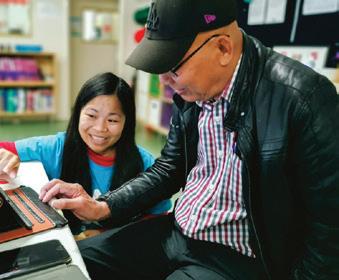
4 minute read
Cultural services
Meeting the needs of all cultures For many older Australians, leaving their home to move into residential care is a lifestyle change that can lead to an emotionally challenging experience.
This transition can become more challenging for older people from culturally and linguistically diverse (CALD) backgrounds requiring access to residential and community aged care services that are sensitive to meeting their specific cultural, spiritual, dietary and linguistic needs. For example, people who migrated from southern and eastern Europe in the 1950s and ‘60s, or from Asian countries in the 1970s and ‘80s, and who are now in need of aged and community care services, will be much more comfortable and secure receiving care from people who understand their specific cultural needs. It is expected that by 2021, more than 30 percent of Australia’s older population will have been born overseas, mostly in a non-English speaking country. With an increasing ageing and migration population, it is essential that Australian aged care services and communities have the capacity to respond to the unique needs of people from CALD backgrounds.


It is also common for people from non-English speaking backgrounds who have developed dementia to forget the English language they have learnt and revert to their original mother tongue even though they may have lived in Australia for many years. A growing focus Meeting the needs of the nation’s older people from culturally and linguistically diverse (CALD) backgrounds has been a growing focus of the Australian Government. The highly complex nature of meeting and understanding the needs of ageing CALD Australians is being increasingly recognised by Government with emphasis and focus also being put on the risk factors specific to CALD Australians that can affect their ageing experience. Providing suitable cultural care has been associated with huge health and wellbeing benefits for this growing group of older Australians which has led to the Government’s introduction of a number of initiatives specific to CALD elders and their care. Cluster facilities Facilities with clusters for CALD older people generally consist of three or more residents from a similar background and staff who speak their language. Cluster facilities also make an extra effort to focus on meeting the cultural, spiritual, dietary and social needs of CALD residents.

Cultural services
Cultural services
The aim of clustering is to: Enhance the quality of care provided to residents from CALD backgrounds in residential aged care facilities Promote and facilitate access to residential aged care facilities for people from CALD backgrounds Enable residents to observe religious, spiritual, cultural and personally significant events Improve communication between staff and residents Maintain dietary customs according to the CALD backgrounds of residents’ religious and cultural preferences Provide social and activity programs that appropriately cater for the needs and interests of CALD residents Some mainstream residential aged care facilities have informal ‘clusters’ that cater for the needs of older people from diverse backgrounds. There are also culturally specific aged care facilities that have formally entered into a contract with the Australian Government to, wherever possible, meet the needs of a specific cultural group. Partners in Culturally Appropriate Care Partners in Culturally Appropriate Care (PICAC) is a national initiative, funded by the Australian Government, designed to improve aged care service delivery for older people from CALD communities. The PICAC initiative has resulted in: More aged care service providers delivering culturally appropriate care to older CALD people Better access for older CALD people to culturally appropriate residential and community care services Older CALD people having a greater capacity to make informed decisions about residential and community based aged care Through training, workshops and information resources, the PICAC program aims to equip and support residential and community aged care service providers to deliver culturally appropriate care. To find out more about PICAC across Western Australia, contact WA PICAC member, Fortis Consulting, on 08 9467 2490. Breaking language barriers Healthcare professionals in General Practice treat patients from a diverse range of cultural and linguistic backgrounds. A significant proportion of the Australian population speak a primary language other than English and patients with limited English proficiency may be less likely to adhere to medication regimes and follow-up plans. They may also have a decreased understanding of their diagnosis, and overall, less satisfaction with their care. Access to high quality medical interpreter services may improve the quality of care for these patients. The Translating and Interpreting Service (TIS National) is an interpreting service provided by the Government. The service covers more than 100 languages and is available 24/7 on 13 14 50. See pages 150–152 for a list of aged care homes and home care package providers in WA who can meet the needs of people from a range of cultures.








